|
|
|
Sort Order |
|
|
|
Items / Page
|
|
|
|
|
|
|
| Srl | Item |
| 1 |
ID:
190214
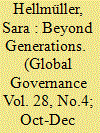

|
|
|
|
|
| Summary/Abstract |
Authors commonly categorize peace missions according to different generations: first-generation missions serving as interposition forces to monitor a cease-fire, second-generation missions with multidimensional mandates, and third-generation missions with enforcement mandates. While the generation typology is useful to show the development of peace missions over time, this article points to four main limitations: ambiguity, reductionism, linear connotations, and restricted applicability. It proposes an alternative categorization distinguishing between a minimalist approach aiming at ending violence, a moderate approach aiming at ending violence and installing some form of good governance, and a maximalist approach aiming at addressing the root causes of conflict. Based on an analysis of all UN peace missions between 1991 and 2020, the article demonstrates how this new classification overcomes the flaws of the generation typology and presents further advantages related to its focus on objectives, its versatility, and its potential for statistical analysis. It thereby allows for a more accurate analysis of UN peace missions and their effectiveness.
|
|
|
|
|
|
|
|
|
|
|
|
|
|
|
|
| 2 |
ID:
190217


|
|
|
|
|
| Summary/Abstract |
While many have observed a regime complex for global clean energy governance, research has not yet accorded sufficient attention to the interplay of multiple streams of politics that have led to the structuring of overlapping governance initiatives and, ultimately, the articulation of a set of norms that hold this regime complex together. To understand these dynamics, this article argues that with the visibly increased agency of transnational actors and international organizations, four mechanisms together are likely to shape regime complexity: divergent state preferences, the agency of transnational actors, practices of intergovernmental organizations, and interorganizational recognition and normative legitimation. Drawing on a qualitative analysis of policy documents and interviews, and a social network analysis, it studies global clean energy governance from 1980 to 2014 to illuminate these dynamics. The findings suggest that the combination of these four mechanisms can explain the evolution from a nonregime to a loosely coupled governance system for clean energy.
|
|
|
|
|
|
|
|
|
|
|
|
|
|
|
|
| 3 |
ID:
190213
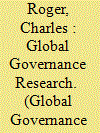

|
|
|
|
|
| Summary/Abstract |
Global governance has been widely embraced as an object of analysis and as a way of “seeing” world politics. Yet we still know little about how publishing has evolved. This article presents the first systematic exploration of these patterns. It uses an original dataset of global governance research to answer three first-order questions: How has publishing varied over time? What issues have scholars focused on? And who has been publishing in the field? The authors found that research has grown and become increasingly diverse—but selectively so. Some marginalized issues feature more prominently than in the rest of international relations, but there are blind spots too. Further, while research is less American and women have been comparatively more active relative to other areas, geographical diversity remains extremely limited. Scholars based in the Global South have been the first authors of less than 14 percent of all publications. To conclude, the article reflects on implications for the field.
|
|
|
|
|
|
|
|
|
|
|
|
|
|
|
|
| 4 |
ID:
190216
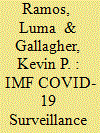

|
|
|
|
|
| Summary/Abstract |
Promoting stability is a core component of the International Monetary Fund (IMF) surveillance’s mandate. The Covid-19 pandemic hit almost every country worldwide. This article evaluates whether and how the IMF surveillance documents in the aftermath of the health and economic crisis have identified risks and mitigation measures to improve health outcomes, protect vulnerable people and firms, and address climate change. Through the IMF COVID-19 Surveillance Monitor, a textual analysis index, the authors found that these issues received relatively little attention in Article IV consultations in 2019, with fiscal issues dominating the discussion. However, the consultations conducted in 2020 show some timely incremental shifts and more attention toward health systems and protecting vulnerable matters. While climate change has become a key part of senior IMF official narratives, it has not had a significant presence in surveillance activities. The techniques and indices developed here can help the IMF improve its surveillance policy.
|
|
|
|
|
|
|
|
|
|
|
|
|
|
|
|
| 5 |
ID:
190212
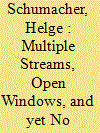

|
|
|
|
|
| Summary/Abstract |
Article VII of the Biological Weapons Convention (BWC) requires states to provide emergency assistance in the case of a deliberate bioweapons attack on any state party to the convention. Since no operational mechanism defining how to request or provide such assistance has yet been established, the painful lessons of the 2014–2016 West African Ebola crisis returned this topic to the agenda of the BWC. This study uses multiple streams analysis to investigate the impact of the Ebola crisis on the considerations of Article VII. While it revived the three streams of the debate—problem, policy, and politics—and opened a policy window, nevertheless, no political entrepreneur was able to couple the streams to produce policy output. As this window of opportunity begins to close, the Covid-19 pandemic seems to be the next focusing event shaping the BWC discourse on emergency assistance.
|
|
|
|
|
|
|
|
|
|
|
|
|
|
|
|
| 6 |
ID:
190215
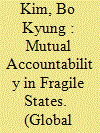

|
|
|
|
|
| Summary/Abstract |
The study reported in this article aimed to find the extent to which the mutual accountability mechanism is applicable in fragile states where state capacity and legitimacy are insufficient. Donors provide foreign aid to fragile states even when there is no firm-standing counterpart to be held accountable. This is done to meet short-term development needs that are heavily focused on humanitarian relief. Based on an examination of the discursive evolution of fragility and donors’ categorization of fragile states based on the capacity-legitimacy configuration, this found that development needs in fragile states can be met through mutual accountability relations with partnership platforms. Represented by the g7+, partnership platforms channel the development needs in a collective form and enable their Member States to gain a certain level of legitimacy. Individual approaches to these countries may be challenging, but seeking strategic responses to development needs through such partnership platforms can create new opportunities for development effectiveness.
|
|
|
|
|
|
|
|
|
|
|
|
|
|
|
|
|
|
|
|
|